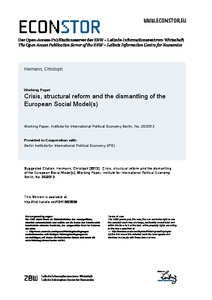Crisis, structural reform and the dismantling of the European Social model(s)

Institute for International Political Economy Berlin
ZBW - Leibniz
2013
25 p.
economic recession ; European social model ; structural adjustment ; social inequality
Working Paper
26
Business economics
English
Bibliogr.
"Following ECB-president Draghi's remark that the European Social Model does no longer exist and the crisis can only be overcome through a combination of austerity and structural reform, this paper examines the consequences of austerity measures and structural reforms adopted during the crisis in a number of EU member states. The hypothesis is that the juxtaposition of the end of the European Social Model on the one hand, and austerity and structural reform on the other was well chosen. In fact austerity and the structural reforms amount to a veritable attack on the foundations of the European Social Model. The first part of the essay summarizes the discussion on the European Social Model, while the second part describes and compares major austerity measures and structural reforms adopted during the crisis. The third part discusses the impact of the newly established European Economic Governance structure on national economic and social policies. The fourth part deals with the consequences of austerity and structural reform, including for poverty and inequality. The essay ends with some reflections on the role of solidarity and the future of the European Social Model. "
Digital
The ETUI is co-funded by the European Union. Views and opinions expressed are however those of the author(s) only and do not necessarily reflect those of the European Union or the ETUI.